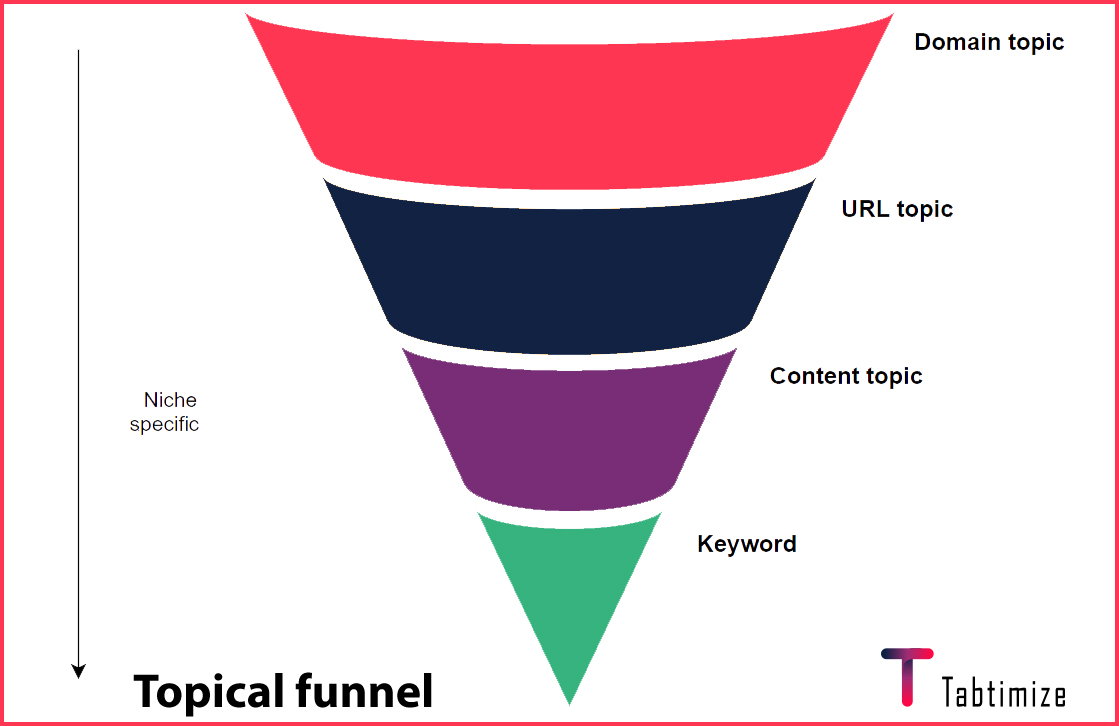What is Link Relevance score (LRS)
Link Relevance Score, or LRS, is an algorithm that quantifies the contextual relevance analysis of web pages in a clear and manageable way. LRS can to some extent be compared to a link authority metric but whereas LRS is only assessing the contextual relevance between two pages.
LRS is not a metric used by Google or other search engines, nor is it the goal of the algorithm to try to replicate these. Link Relevance Score is built on a combination of understanding human language and SEO’s understanding of what a contextually relevant link is.
The LRS is based on the overall idea of being able to quantify and quickly assess the contextual relevance of a link (link opportunity) between two web pages.
How is the LRS structured?
The Link Relevance Score is divided into four validation stages, which ensure that a relevant basis can be created for two pages and at the same time ensure that the two pages are not identical.
Validation stages:
Domain to domain
Based on the entire domain, it is analyzed, among other things, which topics the site is centralized around.
This is what we call the Domain topic:

This is done to ensure the overall understanding of the purpose of the domain, as there may be pages where the individual pages may have its own purposes that do not necessarily address the overall purpose of the domain, which we will get into later.
Based on how specific the text is on the specific topics, each topic will be assigned a numeric value which will be taken into account when the Link Relevance Score is calculated.
This value is then compared with the values of other relevant domains to then determine a score based on the two domains’ relevance to each other.
The importance of each stage is based on the basis of the depth that the stage represents in our topical funnel:

A non-relevant Domain topic will not affect the two pages’ ability to be considered as relevant or not but this is typically a factor that will increase the likeliness of a high Link Relevance Score.
Pages that do not have relevant relation to the opposite pages’ Domain topic will therefore sometimes not score a particularly high Link Relevance Score but as there are other factors that are considered more important than the Domain topic, this is not always the case.
This is also based on the idea that two pages that have a page-to-page contextual relevance match still considered a highly valuable and relevant link.
Page to page
In the same way as the overall topic of the domain is analyzed, the individual pages’ overall topics (URL topic) are also analyzed as well as the relationship between the pages, to ensure that the two pages are included in the same topic/niche.

In addition to an assessment of the page’s main topics, each section of the page’s main content is also analyzed to assess the Content topics of the individual sections.

Both URL topic and Content topic will be compared with the opposite page to evaluate the relevancy.
Page to domain
At this stage, it is assessed to what extent the two pages have relevant domain topics, URL topics, and Content topics.
The next step is to determine to what extend the two pages have a contextual relation to the Domain topic.
This is not the most critical stage but it will increase the likeliness of a high Link Relevance Score.
Link to page
The final validation stage addresses whether the keywords of the pages have an overall relevance to each other and if there is a suitable anchor text suggestion.
This stage have two validation factors:
- Keywords
- Anchor text suggestions
Keywords
Our analysis of the page will reveal a bunch of different keywords on the page. We then compare the two pages’ keywords to assess the relevancy of the keywords.

Anchor text suggestions
Based on the relevant keywords found on both pages, an assessment of places in the text where possible anchor texts can be linked from is being made.

Each anchor text suggestion is then compared to the overall understanding of the opposite page’s text to assess the relevancy of the particular anchor text suggestion.
Both the relevant keywords and anchor text suggestions are considered in the overall calculation of the Link Relevance Score.
Notable additional factors
Quality scores of the text and data points
Every text will be given some quality scores based on each topic and keyword’s relevance, importance, dominance, centrality, and the semantics of the text.
Therefore pages with low-quality scores will have lower chances for a high Link Relevance Score and could have far fewer link opportunities than pages with high-quality scores.
Which use cases can LRS be used for
One of the disadvantages that typically accompanies qualitative data is that it is difficult to be compared with other data and often requires a subjective interpretation.
Link Relevance Score, however, offers many advantages as it manages to quantify, qualitative data and present it in a manageable way, which should help SEOs to get even better results with their efforts of building links.
LRS can be used in many ways and you may find that you can use it in your very own way with your unique case. These examples below come from use cases, which we often experience LRS being used for:
Review existing link profile based on relevance.
If you already have a number of backlinks and want to minimize the risk of being hit by an algorithmic penalty from the search engines, you can advantageously review your own website’s link profile and look for backlinks with low LRS.
Easily review and sort link opportunities.
When you use the Tabtimize’s Backlink Engine function or other tools that can display link opportunities, then you will be able to easily sort these, according to their LRS, and thus their relevance to your site.
If you use Tabtimize’s Backlink Engine function, then you can also specify your search for relevant link options with other sorting options, such as specific words, topics, SERP position, word count, and much more.
Assess competitors’ relevance profile.
A good way to make sure you have a more relevant link profile than your competitors is to analyze your competitors’ link relevance profile.
Do they have a more relevant profile than you? – What types of backlinks give them the highest relevance and can you replicate it or even surpass it?
Assess the potential of possible new upcoming links based on relevance.
Backlinks can come from many different sources. You may have worked on PR, social media, or anything else that can give you some good organic backlinks.
The question then is: Do these links benefit your link relevance profile and do they come from relevant sources?
You can get the answer to this before you choose to create relationships through, for example, PR and social media or help you select the most relevant to your case
Use LRS as a KPI and increase your page’s own relevance profile.
There are already many KPIs that marketers need to be aware of. However, it will really make sense to keep an eye on your website’s LRS, as an indicator of a good link profile.
Evaluate upcoming links’ own relevance profile.
This task can be quite a comprehensive task, but it would give you great gains in the long run.
If you make sure that the pages you get links from, themselves consist of a relevant link profile, it will give you two huge benefits:
1. If the page from which you need a link itself has a relevant link profile, then the probability that it will receive relevant traffic from its own backlinks is high and thus it increases the possibility that you will benefit from the relevant traffic, channeling relevant traffic to your site.
2. The link you get comes from a source that itself has a relevant link profile, which tells the search engines that this is a healthy link that is highly likely to benefit both sides and should be given a high weighting.
Analyze and ensure relevance from external link providers.
Link building is a time-consuming process and many may find themselves forced to outsource that part of their SEO.
However, you can advantageously ensure that the content that is written also benefits your website. Also, you can use LRS to assess which websites you want the content to be linked from, as the domain that will be linked to your site might have a non-relevant overall topic that possibly could hurt the overall link relevance profile.
You can also use LRS as a KPI for your link providers and make sure they maintain a high quality in their service.

